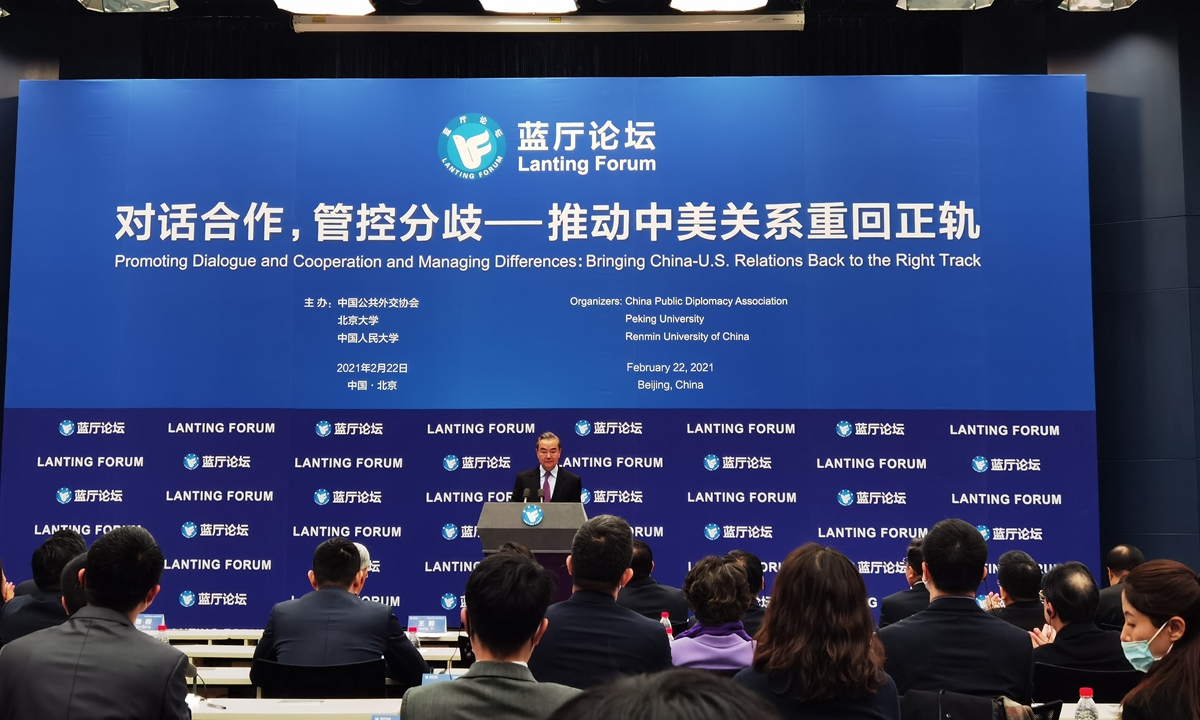
Photo: Yang Sheng/GT
At the Lanting Forum in Beijing on Monday, China's State Councilor and Foreign Minister Wang Yi delivered a speech themed, "Promoting dialogue and cooperation and managing differences: bringing China-US relations back to the right track."In his address, Wang reiterated China's consistent stance and offered some new thoughts. This is a response to some concerns from the international community, especially Western societies, about China's development path.
To begin with, a major concern regards China not being democratic. They tend to believe that China's reform and opening up will regress and the country will return to the era of the former Soviet Union. Certain leaders from the US and the West think that some of Chinese leaders have no democratic concepts and cannot understand the political language of the modern world. In response, Wang said, "China is a country that always upholds and promotes people's democracy… Democracy is not a patent of a few countries. It is a common value of humanity."
Wang's remarks recognized the universality of democratic values. But universality of democracy does not necessarily mean it has the exact same democratic form, path or methods of praxis in different countries. Different democracies share the same democratic goals, but some attach more importance on the process, and some focus more on the result. While some prioritize direct democracy, others value indirect democracy. Some attach importance to competitive democracy, yet some appreciate consultative democracy. Different paths can provide more diverse political outcomes. This can help prevent one specific political system from going to extremes. When countries chose their own democratic path, the process should also be democratic, rather than coercive.
Second, the West is concerned that the Chinese government does not protest human rights. Wang said, "China takes a people-centered approach to human rights. We believe that the rights to subsistence and development are basic human rights of paramount importance. At the same time, we strive for comprehensive and coordinated development of economic, social and cultural rights as well as civil and political rights."
This statement reflects two major characteristics of human rights protection in China. First, China protects people's basic human rights of subsistence and development. Second, China's human rights protection is comprehensive. One cannot live a life by relying on certain specific rights, but they can thrive in a system of rights. In countries with different levels of development, people are in need of different rights. There should not be a one-and-only set of criteria.
Third, some outsiders are worrying that China's rise will undermine world peace. Great powers, especially rising ones, exert influences on world peace mainly through two ways: excessive action or inaction. First, some major powers overly interfere in the international affairs and internal affairs of other countries. This poses challenges and damages to world peace.
In the past few years, with the advancing of China-proposed Belt and Road Initiative, concerns are increasing among the international community over whether China will export ideology and interfere in other countries' domestic affairs. This constitutes an unfavorable international environment for China's development. There are also some major powers which refuse to take international responsibility. This has led to a power vacuum, global turbulence and insecurity. Wang not only reiterated that, "China is a country that always values and safeguards world peace," but he also made it clear that China has no intention to export ideology. Nor does it attempt to overturn the government of any country. This is a solemn promise made on behalf of the Chinese government. As Wang said, China, "has contributed to world peace in turn with its development." This reflects the fact that China will never evade its responsibilities as a major power to maintain world peace and stability. Nor will cause instability with world politics.
Fourth, there are also concerns that China's rise will subvert the existing international order. The current international order has been built and dominated by the US and the West. China is also a beneficiary and defender of this order. However, there has never been an immutable order in this world. The existing international order emerged from the old one, and is in continuous changes. Changes are absolute, but what matters is how the international order changes.
The best answer today is: all countries in the world should pursue and uphold multilateralism and address global issues through consultation. After undergoing vicissitudes of international politics, countries can then call for the democratization of international relations. At the just-concluded virtual G7 summit and the online Munich Security Conference, US allies, including Germany and France, all expressed similar expectations and demands.
Both China and the US are major powers. The world cannot run without them. However, China and the US are not what the whole world is about. China-US relations are only a part of international relations. The hegemonic pattern, be it a bipolar one or a unipolar one, will only be a flash in the pan. Only when the US lowers its posture, abandons its narrow-mindedness, and puts itself in the right position, can a benign China-US relationship begin. This will allow for a more stable, secure and harmonious world system to be built.
The author is professor at the Center for American Studies, Fudan University. opinion@globaltimes.com.cn
